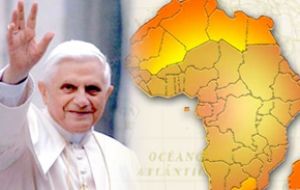MercoPress. South Atlantic News Agency
Pope warns Africa about “first world toxic materialism” colonialism
 Benedict praised Africa's rich cultural and spiritual treasures calling them a “spiritual lung” for the world
Benedict praised Africa's rich cultural and spiritual treasures calling them a “spiritual lung” for the world Pope Benedict has warned that a form of colonialism continues to blight Africa. Opening a three-week synod of African bishops, he said political colonialism was over. But he said the developed world continued to export materialism - which he called “toxic spiritual rubbish” - to the continent.
Almost 200 bishops from 53 African states have gathered to discuss how the Catholic Church can help resolve the continent's social injustices and wars.
The Pope says he will attend as many of the working sessions of the synod as possible, his other duties permitting.
Unaccustomed rhythms of Africa filled the huge St Peter's Basilica in Rome, as Pope Benedict formally opened the special synod, reports the BBC's David Willey in Rome. A choir from the Democratic Republic of Congo sang hymns in the Kikongo and Lingala languages, and prayers were also said in Swahili, Portuguese, Amharic, Hausa and Arabic.
Pope Benedict praised Africa's rich cultural and spiritual treasures, calling them a “spiritual lung” for the world.
But he said the continent was afflicted by an export of the “so-called 'first world'... [the] toxic spiritual rubbish” of materialism.
“In this context, the political colonialism is never finished,” the Pope said.
He said Africa also suffered increasing religious fundamentalism, in the form of religious groups which “act on behalf of God” but “teach intolerance and violence”.
The Pope said evangelisation was “urgent” in Africa - though the Catholic Church is already growing faster there than in any other part of the world, nearly trebling in size to 150 million followers over 30 years.
This will be the second synod of bishops organised at the Vatican to be devoted specifically to the problems of Africa.
The first took place in 1994 at the very moment when the Rwandan genocide was beginning, but turned out to be little more than a talking shop, our correspondent says.
Among the experts invited by the Pope to address the synod - which has only advisory powers - will be the former head of the joint UN/African Union peacekeeping mission in Darfur. A small number of women religious have also been invited to attend. (BBC).-




Top Comments
Disclaimer & comment rulesCommenting for this story is now closed.
If you have a Facebook account, become a fan and comment on our Facebook Page!